Books
Books
in random order
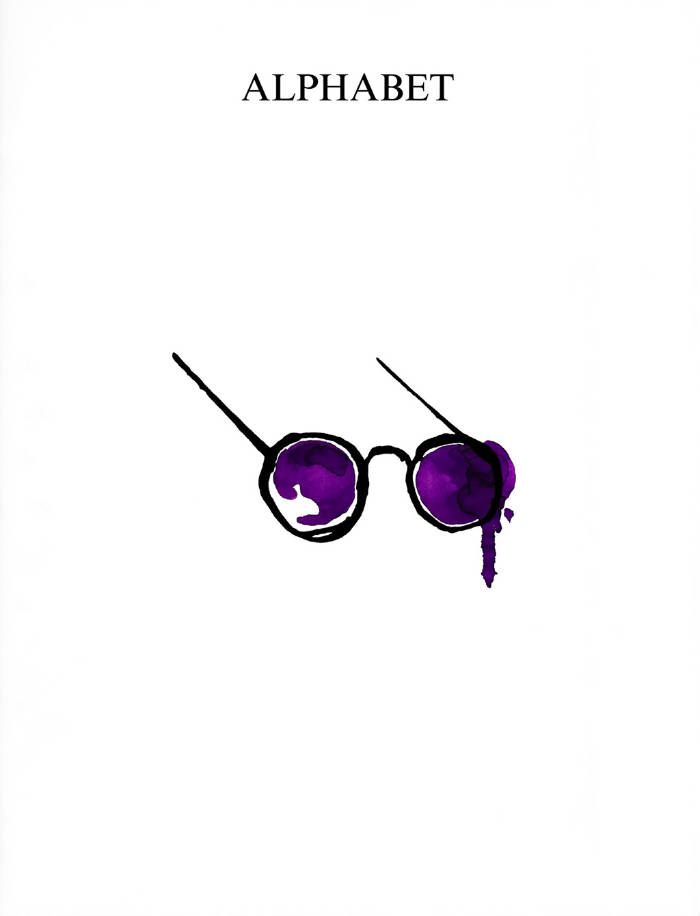
Alphabet Magazine #01
The first issue of the magazine made by artists, founded by Donatien Grau and Thomas Lenthal. Contributions by Mathias Augustyniak, Naomi Campbell, Théo Casciani, Michael Chow, Pan Daijing, Es Devlin, Claire Fontaine, Edwin Frank, Theaster Gates, Nicolas Godin, Alejandro Jodorowsky, Hedi El Kholti, Michèle Lamy, Paul McCarthy, Ian McEwan, Eileen Myles, Marc Newson, Hans Ulrich Obrist, Diana Widmaier Picasso, Ariana Reines, Barbara Chase-Riboud, Julian Schnabel & Jason Momoa, Hanna Schygulla, Juergen Teller, Iké Udé, McKenzie Wark, Robert Wilson, Yohji Yamamoto.
Alphabet is the artists' magazine. Here, they run the show. They write, they make images, they select their own works, they interview the figures they admire, they tell us what we did not know about them nor could have ever fathomed about life. This magazine is conceived entirely to put them in the driver's seat, and to enable readers to become part of the unique vision of some of today's greatest luminaries.
It is a manifestation of the creative community, coming together from all fields, from all generations and threads of culture. Writers, musicians, designers, painters, sculptors, poets—artistic figures of every kind converse all the time in their lives, but they did not have a shared space for their editorial projects. This is it.
Everyone who finds their way into Alphabet has made a mark on life, art, and culture, in a way that signals their importance to the present. Some of the contributors may be world famous, others well respected, others on the way to becoming the legends they already are. Their relevance to culture is the same, and that is why they all belong here, in the endeavor of the creative community. There is no hierarchy of status, or domain, or apparent impact. Some of the greatest revolutions happen undercover. Some of the most established voices are still breaking ground. The magazine's premise is simple: the old opposition between pop and underground does not make sense anymore. There are many creative communities, each following its own rules, each inventing its own space. Here, wherever they come from, whatever their community, artists can exist together, with the same intention of changing, and improving, what life is; with the same belief that art matters more than anything else.
None of the contributors is here randomly. They keep life thrilling and exhilarating, challenge the perception of everything and anything. Their role in shaping every aspect of life can hardly be overstated. That is why they needed a place to elaborate their own alphabet, their way of ordering and structuring language, the world, and the fabric of life—a place of freedom, where everything would be done to highlight their visions, where the very design would be a shrine to their magic. Even the distribution of the magazine was conceived with artists—each contributor suggesting sites of their liking.
Alphabet is also the magazine of magazines. Here, readers find essays, fictions, poetry, visual projects, DIY methods, recommendations from those who know, even games and astrology—and an artist's alphabet, articulating an entire universe. Anything that has ever formed a section of a magazine could find its way here. Even the cover is conceived by an artist: it was conceived especially by the legendary Robert Wilson. Artists will rejuvenate what magazines are, and magazines will be kept forever young by and with them.
Founded by Donatien Grau and Thomas Lenthal, Alphabet is a bi-yearly art magazine. Not a magazine about art. It's a magazine made by artists. Each contribution like an œuvre, making it the ultimate collector piece. Each cover is designed, with the word Alphabet, by a different artist, initiating a cult series.

You Must Believe in Spring
Twenty years after she first chanted in Tahrir, Hanan’s son is living under military rule in Egypt. Though he is both a disciple of the national Sufi institute and a swimmer representing the Armed Forces, proximity to power cannot undo his revolutionary birthright: like his mother and grandmother before him, Shahed is an undercover rebel.
When a general arrives at the Sufi institute looking for help with a military assignment, Shahed accepts, all while concealing his own plans for resistance. The mission takes him behind the walls of a prison town, inside a secret army barracks in the Sinai desert, and deep into the murky waters of the past.
As he wades through his mother’s repressed memories and the state’s repressed histories, Shahed grapples with the traumas of the revolution and the weight of authoritarian rule, searching for new ways to revolt for freedom.
Mohamed Tonsy is a queer Egyptian writer and ceramicist. Formerly an architect and a triathlete representing the Egyptian Triathlon Federation, he completed a PhD in Creative Writing at the University of Edinburgh. His writing has appeared in Mizna and Epoch Press and was shortlisted in MFest’s 2021 Short Story Competition. You Must Believe in Spring is his first book.

Studio Visit
Studio Visit collects two decades of work by Brooklyn-based artist Sara Greenberger Rafferty (born 1978), known for her material transformation of photographs and her use of comedy as an artistic strategy. Organized by material sensibilities around paper, plastic, glass, metal, fabric scraps, and "garbage," Studio Visit rethinks the monograph format, revealing Sara Greenberger Rafferty’s practice through intimate studio documentation, sketches, notes, and other ephemera, punctuated by full-color case studies of major works.
With image descriptions by art historian Kate Nesin and new writing by Kristan Kennedy and Oscar Bedford, as well as reprinted texts by poet Lisa Robertson and media scholar Shannon Mattern, among others, Studio Visitsurveys Sara Greenberger Rafferty's cultural commentary through dynamic and conceptually rigorous art.

4 Basic Kinds of Lines & Colour
On occasion of the Book as System exhibition, we are thrilled to publish a facsimile reprint of Sol LeWitt’s iconic Four Basic Kinds of Lines & Colour, co-published Printed Matter, Inc. & Primary Information.
Published in 1977 by Lisson Gallery, Studio International, and Paul David Press, the 34 page staple-bound book is an early example of LeWitt’s rigorous, algorithmic process in which a set of rules is run through its permutations to generate corresponding images. First in overview and then in detail, the publication sets down all possible combinations in overlaying four basic lines (vertical, horizontal, right-facing diagonal, left-facing diagonal) followed by a distinct combinatory system of four basic colors (yellow, black, red, blue).
Each spread is composed of these two parallel systems played out one at a time, with escalating line combinations on the left hand side and corresponding color combinations on the right. LeWitt’s Four Basic Kinds of Lines & Colour (1977) followed the publication of Four Basic Kinds of Straight Lines (Studio International, 1969) and Four Basic Colours and their Combinations (Lisson Gallery, 1971), and serves as a kind of synthesis of the two systems described in those earlier volumes.
Published by Printed Matter, Primary Information, 34 pgs, 20 × 20 cm, Softcover

You Can Vibe Me On My Femmephone
You Can Vibe Me On My FemmePhone follows three friends, in a near-future Los Angeles, who are trying to improve themselves using a phone with a feminist operating system. Join Veronica, Phoebe, and Remy on their absurd adventures to seduce artists, entrap local Proud Boys, and enter a kinky queer horse-play scene. Their FemmePhones, programmed with their personal values, guide them toward the transformative love and professional passions they seek. But what choices will they make when they disagree with their phones and what does this mean about their feminist values? Kamala Puligandla’s heartfelt, humorous novella takes you on a wild ride about queer love, self-knowledge and growth.
Size: 4.5" x 7", 108 pages, perfect bound
Self-published by Co—Conspirator Press with the support of Feminist Center for Creative Work. Copy edited by Pratishtha Kohli. Illustrations by Phoebe Unter. Designed by MJ Balvanera, Riso-printed by Neko Natalia.
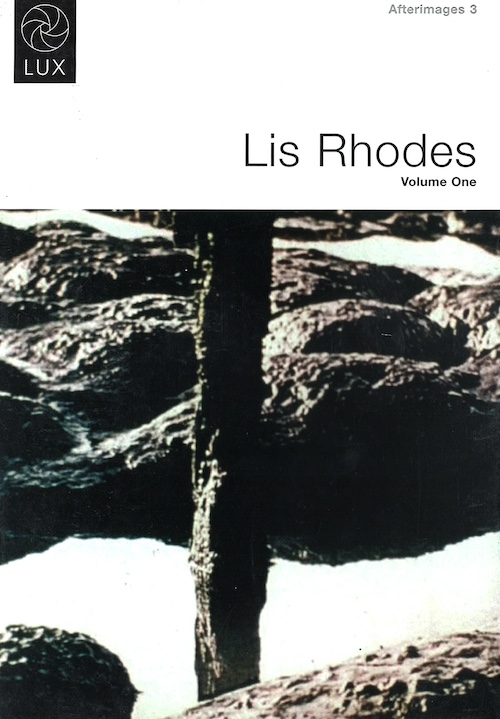
Afterimages 3: Lis Rhodes Volume 1
This DVD contains:
Light Reading, 1978, 20 min.
Pictures on Pink Paper, 1982, 35 min.
Cold Draft, 1988, 28 min.
Lis Rhodes has been at the forefront of British experimental filmmaking since the early 1970s. She studied at the North East London Polytechnic and the Royal College of Art. A strong formal aesthetic has been developed in her films, reflecting her involvement with the debates and practice which emerged from the London Filmmakers' Co-operative, where she was Cinema Curator 1975-6. Early 'expanded' works such as Light Music (1975) fused performance and multi-screen projection with an exploration of the visual qualities of sound. Her analysis of broader political and social questions can be traced to her later films, which combine formal rigour with a passionate critique of issues from nuclear power to domestic violence. As an active campaigner for women's rights, Rhodes was a founder member of Circles, the first women's artist film and video (1979) and was an Arts Advisor to the Greater London Council between 1982 and 1985. She lives and works in London and teaches at Slade School of Fine Art, University College, London.

Your Silence Will Not Protect You
With a preface by Reni Eddo-Lodge and an introduction by Sara Ahmed.
Audre Lorde (1934-92) described herself as ‘Black, lesbian, mother, warrior, poet’. Born in New York, she had her first poem published while still at school and her last the year she died of cancer. Her extraordinary belief in the power of language – of speaking – to articulate selfhood, confront injustice and bring about change in the world remains as transformative today as it was then, and no less urgent. This edition brings Lorde’s essential poetry, speeches and essays, including ‘The Master’s Tools Will Never Dismantle the Master’s House’, together in one volume for the first time.

Un-Break My Walls
The first monograph on Christiane Blattmann takes its title from her solo show Un-Break My Walls at Kunsthalle Münster in 2019. Blattmann intricately interweaves, intermeshes, combines, compounds, merges, and processes in her work not only materials but also structures, things, stories, characters. The volume includes extensive illustrations of exhibitions, projects, and works, and a great number of black-and-white images capture the artist’s studio practice. The interactions of materials, along with theoretical and literary references, serve as important points of departure, and the emblematic outcomes involve text and texture as material structure and patterned surface; vivid condensation and entanglement; and invitations to exploration and reflection. The book compiles different elements designed on a series of shifting layers. Texts by Merle Radtke and Chloe Stead and a conversation between Christiane Blattmann and Than Hussein Clark provide insight into Blattmann’s art, complemented by a piece of fiction by Huw Lemmey.
Texts by Merle Radtke, Huw Lemmey, and Chloe Stead, and a conversation between Christiane Blattmann and Than Hussein Clark

desespiegles
This publication is presented as an object-book-manifesto of a ‘desespiegles’ way of thinking. It “translates” the trains of thought that architect-artists Anne Philippe and Jolien Naeyaert exchanged via videoletters. The videoletters mainly occurred during the covid period. Questioning the scope of the addressed images, these exchanges revealed a play of symmetries. It shows a series of interrogations, linking the intimate with the collective. The move towards a publication was obvious after conversations with Loes, Phyllis, An and Teresa of nadine. The desire to activate reading in a performative way, mirrors the exchange of videoletters. It continues the process-based methodology that inventively gave birth to a publication through the physical manipulation of the work. The riso-technique proved particularly suitable for this project, as the hands, the gaze and the exchange all played a role during the object-making process.
Dannie.n is an art-zine, published by nadine, about the artistic research, themes, and topics of discussion of the artists involved in nadine. nadine invites an artist or collective to create each new edition.
Dannie.p is a limited-edition artist's book by desespiegles (57 copies). nadine is supported by Vlaamse Gemeenschap, VGC, Brussels Hoofdstedelijk Gewest.
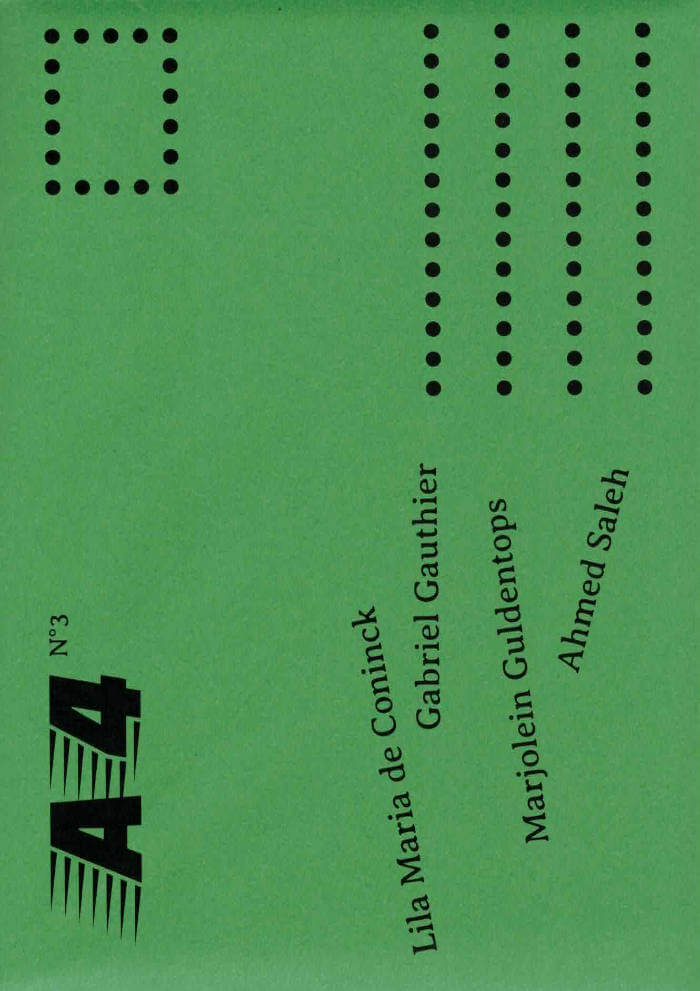
A4 review N°3
Marjolein Guldentops, Ahmed Saleh and 2 more
Founded in 2023, A4 is a poetry review which showcases and explores contemporary writings practices. Run by Littérature Supersport collective, the object is seen as the extension of their events. The review takes the form of 4 postcards which, when placed side-by-side, form an A4-sheet. A light (even precarious) format for literature that slips into the back pocket of pants and hangs on fridge doors. Each issue features unpublished texts by 4 authors. Wrapped in colors, A4 is distributed by post and available in good bookshops, in Brussels, Liège, Paris and Marseille.
This third issue presents texts by : Lila Maria de Coninck, Gabriel Gauthier, Marjolein Guldentops & Ahmed Saleh.
Ahmed Saleh (born 1998) is a Palestinian writer and poet from Gaza. He studied business administration and political science and is currently living in Brussels. Ahmed writes articles in Arabic and English, several of which have been published on various platforms.
Marjolein Guldentops (Belgium, 1994) is a visual artist, author, and performer. Her artistic practice spans various mediums, including text, video and performance. Rooted in the concept of worlding, her work explores the urban rhythms, flows, and semantics that shape perceptions of space and language in both physical and metaphysical senses.
Gabriel Gauthier is a graduate of the Beaux-arts in Paris. He writes books, performs and makes music. He has published Simurgh & Simorgh and Contra at Théâtre Typographique (2016, 2024) and Speed at Vies Parallèles (2020). He has designed pieces at the border of dance and visual arts (Cover, Rien que pour vos yeux). Space, his first novel, was published by Corti.
Lila Maria de Coninck (2004) is a Belgian creator living in The Hague. She makes music, theatre and writes poetry. The guiding principle in her works is the use of multilingualism and miscommunication to promote creativity in her mother tongue, Dutch.
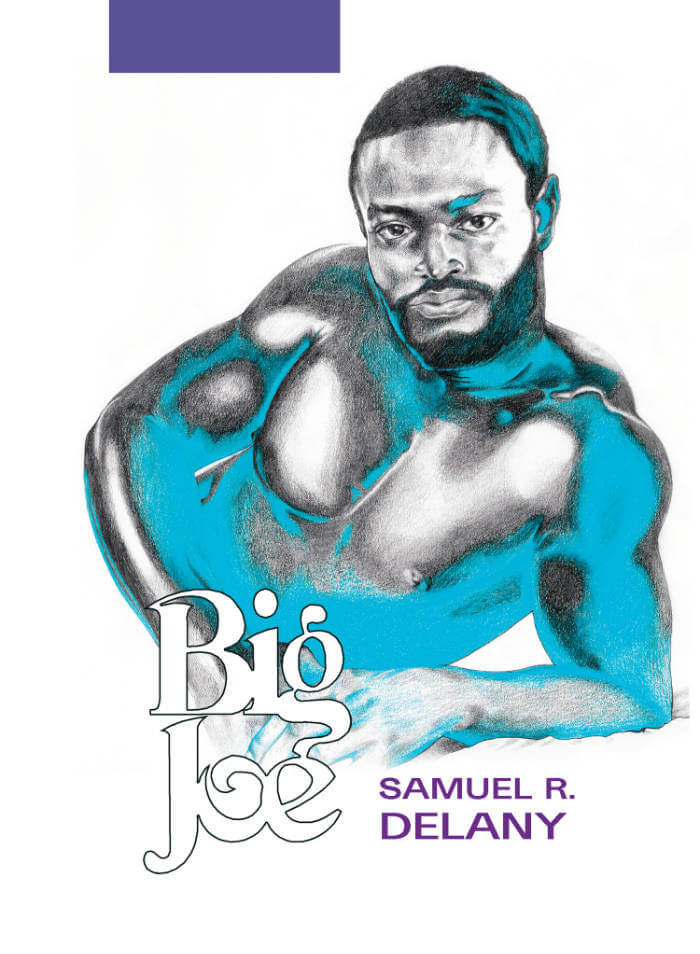
BIG JOE
A chance encounter with two older fellows at the movie theater has the young vagabond Ligie on his way to Lot-8, a trailer park down the road with an unconventional local reputation. There, Ligie meets Big Joe and his extended Lot-8-family: a tight-knit community of freaks all sectioned together by the landlord at the outskirts of town.
Weaving together colorful characters and outright carnal debauchery, BIG JOE is a radical pastoral of community, desire, and the strangeness of knowing one another.
Featuring color illustrations by Drake Carr and Sabrina Bockler.
Cover illustration by Drake Carr
Samuel R. Delany is the author of numerous books and novels, including the Nebula Award-winning Babel-17 and The Einstein Intersection, as well as Nova (now in a Library of America anthology) and Dhalgren. His 2007 novel Dark Reflections won the Stonewall Book Award. Other erotic novels include Equinox, Hogg, The Mad Man, Throu gh the Valley of the Nest of Spiders, and Shoat Rumblin. Delany was the subject of a 2007 documentary, The Polymath, by Fred Barney Taylor, and he has written a popular creative writing textbook, About Writing. He is the author of the widely taught Times Square Red/Times Square Blue and numerous books of essays; his book-length autobiographical essay, The Motion of Light in Water, won a Hugo Award in 1989. As e-books, paperbacks, or audiobooks, his works are available through his website at: www.samueldelany.com
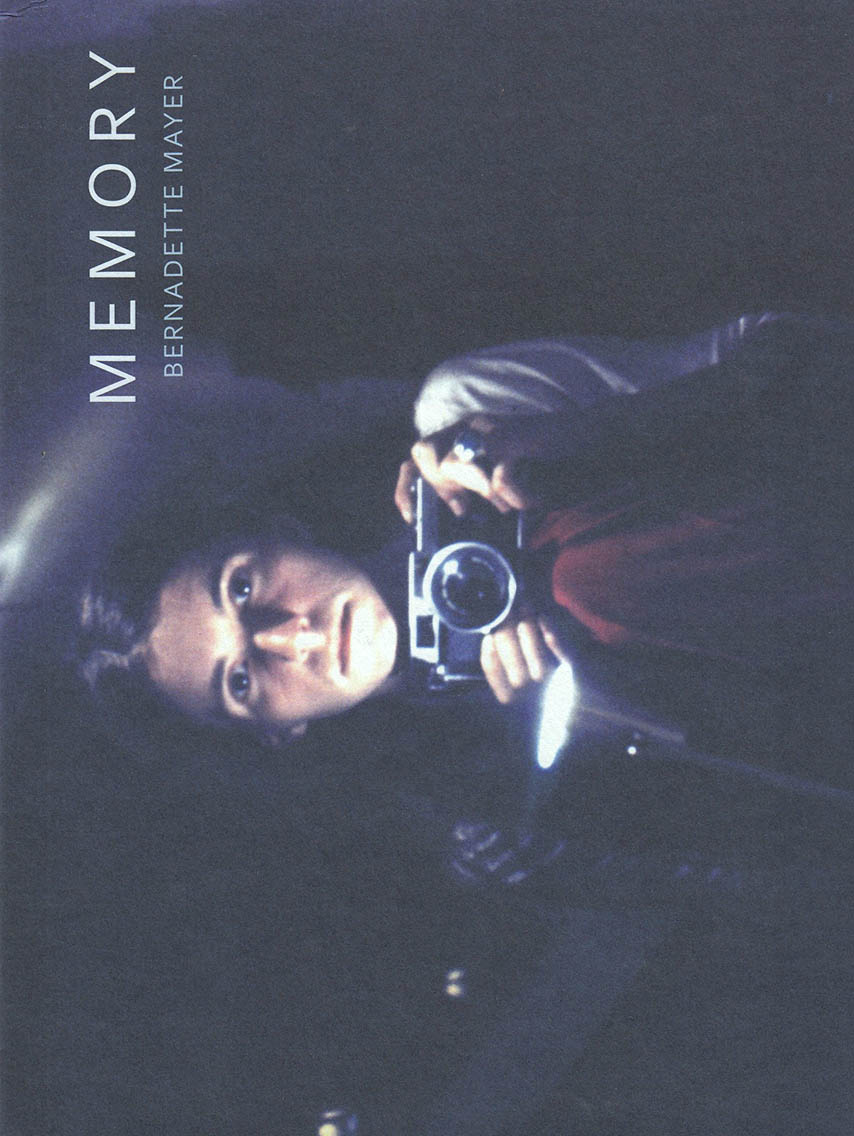
Memory
In July 1971, Bernadette Mayer embarked on an experiment: for one month she shot a roll of 35mm film each day and kept a journal. The result was a conceptual work that investigates the nature of memory, its surfaces, textures and material. Memory is both monumental in scope (over 1,100 photographs, two hundred pages of text and six hours of audio recording) and a groundbreaking work by a poet who is widely regarded as one of the most innovative experimental writers of her generation. Presaging Mayer's durational, constraint-based diaristic works of poetry, it also evinces her extraordinary —and often unheralded— contribution to conceptual art.
Mayer has called Memory "an emotional science project," but it is far from confessional. This boldly experimental record follows the poet's eye as she traverses early morning into night, as quotidian minutiae metamorphose into the lyrical, as her stream of consciousness becomes incantatory. In text and image, Mayer constructs the mercurial consciousness of the present moment from which memory is —as she says— "always there, to be entered, like the world of dreams or an ongoing TV show."
This publication brings together the full sequence of images and text for the first time in book form, making space for a work that has been legendary but mostly invisible. Originally exhibited in 1972 by pioneering gallerist Holly Solomon, it was not shown again in its entirety until 2016 at the Poetry Foundation in Chicago and then again in 2017 in New York City at the CANADA Gallery. The text was published without the photographs in 1975 by North Atlantic Books in an edition that has long been out of print.
Bernadette Mayer (born 1945) is the author of over 30 books, including the acclaimed Midwinter Day (1982), a book-length poem written during a single day in Lenox, Massachusetts, The Desires of Mothers to Please Others in Letters (1994) and Work and Days (2016), which was a finalist for the National Book Critics Circle Award. Associated with the New York School as well as the Language poets, Mayer has also been an influential teacher and editor. In the art world, she is best known for her collaboration with Vito Acconci as editors of the influential mimeographed magazine 0 TO 9.

Practical Performance Magic
What if, when a performance is described as “nothing short of magical,” it is not just a metaphor? Maija Hirvanen and Eva Neklyaeva wrote a book together exploring the techniques involved in creating and curating contemporary performances through practical magic.
Like feminist magic, performance magic is not inherited or exclusive, but learned and inclusive. Anyone can practice it.
This is a book of recipes and spills, based on lived experience, observations and bewilderments of both writers.
Concept and writing by Maija Hirvanen and Eva Neklyaeva Design: POMO Publisher: Friends of Physical Contemporary Art, in the frame of Performing Portals project Editing: Leah Whitman-Salkin Funded by Art Promotion Centre Finland

a queer anthology of wilderness
Featuring Zoe Leonard, Eileen Myles, Jimmy DeSana, Princess Julia, Olivia Laing, Simon Costin, Timothy Thornton, Mary Manning and many more. Published 2020.

Loving Corrections
Ethical, pondering, and wondrous, adrienne maree brown’s Loving Corrections is a collection of love-based adjustments and reframes to grow our movements for liberation while navigating a society deeply fractured by greed, racism, and war. In this landmark book, brown invigorates her influential writing on belonging and accountability into the framework of “loving corrections”; a generative space where rehearsals for the revolution become the everyday norm in relating to one another.
Filled with practical wisdom on how to be a trustworthy communicator while providing bold visions for a shared future, Loving Corrections can speak to everyone caught in the crossroads of our political challenges and potential. No matter how new to the struggle, or how numerous our failures, brown’s indispensable writing is an invitation to us all. Includes an afterword by Janine de Novais.

The Land of All Time
The latest collection from prolific American poet Clark Coolidge, who has often been associated with the Language School and the New York School but has truly forged a unique style. A life-long jazz drummer, his poems can be approached as improvisational compositions with strange arrangements of words, statements, and sounds that are vibrant, frequently hilarious, and jarring. His upended syntax and surprising associations reflect a world awash in information; an advanced civilization dealing with ever more rapid change. His poems are explorations into the possibilities of language. This kind of work could, serendipitously, lead to new patterns of thinking, new definitions, new meanings, perhaps even new ways of dealing with old problems.

Dysphoria Mundi: A Diary of Planetary Transition
A revolutionary book tracing the collapse of the paradigms that have organized the world for centuries.
In Dysphoria Mundi, Paul B. Preciado, best known for his 2013 cult classic Testo Junkie, has written a mutant text assembled from essays, philosophy, poetry, and autofiction that captures a moment of profound change and possibility. Rooted in the isolation of the COVID-19 pandemic, and taking account of the societal convulsions that have ensued, Preciado tries to make sense of our times from within the swirl of a revolutionary present moment.
The central thesis of this monumental work is that dysphoria, to be understood properly, should not be seen as a mental illness but rather as the condition that defines our times. Dysphoria is an abyss that separates a patriarchal, colonial, and capitalist order hurtling toward its end from a new way of being that, until now, has been seen as unproductive and abnormal but is in fact the way out of our current predicament.
With echoes of visionaries such as William S. Burroughs and Kathy Acker, Preciado’s theoretical writing is propelled by lyric power while providing us with a critical toolbox full of new concepts that can guide our thinking and our transition, cognitive emancipation, denormalization, disidentification, “electronic heroin,” digital coups, necro-kitsch. Dysphoria Mundi is Preciado’s most accessible and significant work to date, in which he makes sense of a world in ruins around us and maps a joyous, radical way forward.
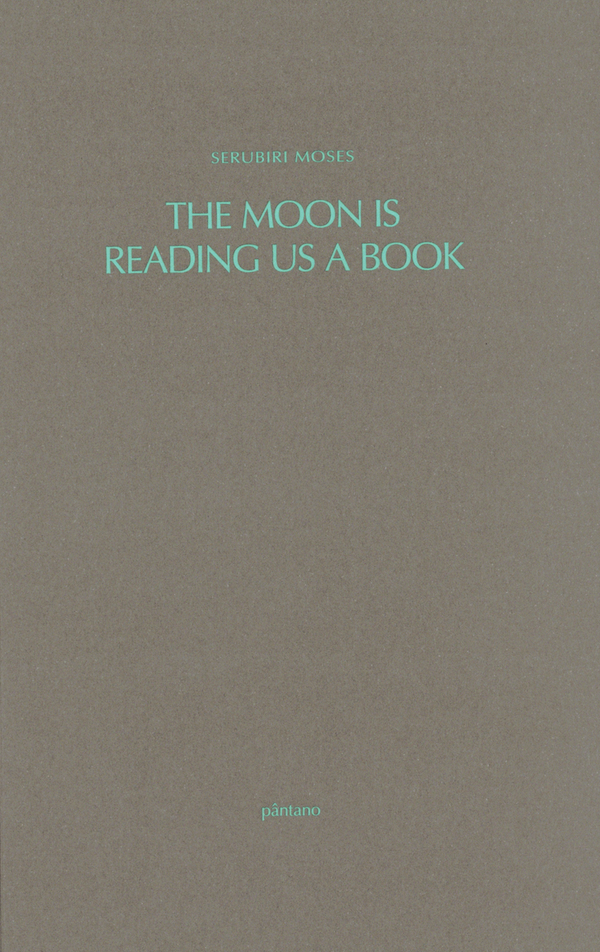
The Moon is Reading us a Book
THE MOON IS READING US A BOOK is the debut collection of poetry from a writer who displays a wide-ranging palette for storytelling and folklore in a suite of narrative poems. The collection is built around an ensemble of characters that range from known to unknown, through which Serubiri crafts visually-inspired poems that combine the photographic, the intensely personal, and the scholarly. In his book, he manages to domesticate larger-than-life figures, including Zanzibari-born singer-songwriter Freddie Mercury and Nigerian-born photographer Rotimi Fani Kayode. Simultaneously pondered and elastic, Serubiri’s poetry lures these figures – and the reader – into an atmosphere that is only as expansive as the interior landscapes he delineates with each succeeding poem. With this he expresses his own doubts and path, from memories of his native Uganda to New York City, through a psychology of decisions and life choices.
Serubiri Moses is a Ugandan curator and author based in New York City. He currently serves as faculty in Art History at Hunter College and visiting faculty at the Center for Curatorial Studies, Bard College. He previously held positions at New York University and the New Centre for Research and Practice, and delivered lectures at Williams College, Yale University, University of Pittsburgh, The New School, basis voor aktuelle kunst, and University of the Arts Helsinki. As a curator, he has organized exhibitions at museums including MoMA PS1, New York; Kunst-Werke Institute for Contemporary Art, Berlin; and the Hessel Museum, Bard College, NY. He previously held a research fellowship at the University of Bayreuth; received his MA in Curatorial Studies at Bard College; and is an alumni of the Àsìkò International Art Programme. He serves on the editorial team of e-flux journal. He has published poetry in the online journals Jalada and Badilisha Poetry Exchange, as well as in print in journals Kwani? 7, Kwani? 8, and READ: A Journal of Inter-Translation (2022). His poetry has been reviewed online in The New Inquiry. THE MOON IS READING US A BOOK is his first book of poetry.

Tar Hollow Trans: Essays
"I've lived a completely ordinary life, so much that I don't know how to write a transgender or queer or Appalachian story, because I don't feel like I've lived one.... Though, in searching for ways to write myself in my stories, maybe I can find power in this ordinariness."
Raised in southeast Ohio, Stacy Jane Grover would not describe her upbringing as "Appalachian." Appalachia existed farther afield—more rural, more country than the landscape of her hometown.
Grover returned to the places of her childhood to reconcile her identity and experience with the culture and the people who had raised her. She began to reflect on her memories and discovered that group identities like Appalachian and transgender are linked by more than just the stinging brand of social otherness.
In Tar Hollow Trans, Grover explores her transgender experience through common Appalachian cultural traditions. In "Dead Furrows," a death vigil and funeral leads to an investigation of Appalachian funerary rituals and their failure to help Grover cope with the grief of being denied her transness. "Homeplace" threads family interactions with farm animals and Grover's coming out journey, illuminating the disturbing parallels between the American Veterinary Association's guidelines for ethical euthanasia and the World Professional Association for Transgender Health's guidelines for transgender care.
Together, her essays write transgender experience into broader cultural narratives beyond transition and interrogate the failures of concepts such as memory, metaphor, heritage, and tradition. Tar Hollow Trans investigates the ways the labels of transgender and Appalachian have been created and understood and reckons with the ways the ever-becoming transgender self, like a stigmatized region, can find new spaces of growth.

A conversation, Nick Zedd & Marie Canet
“What happened to my book?”
This was the last email we received from Nick, in December 2021. A short, concise demand, which we responded to, telling him that the transcription was coming soon and that Marie was finalising the introduction. Little did we know, what Nick surely already knew: he was dying. The urgency should have given it away, but Nick was always blunt in our email exchanges.
Nick passed away on February 27th, 2022. We regret not getting the transcription to him while he could still edit it, so this book in your hands remains an unabridged testament.
The only thing he did edit were his final words, in an unsolicited email in September 2021:
“I was thinking about when you asked me if I had any final words, that it would be better to have me say: Freedom or death. At the crossroads. With a key.”
So we leave you with this; a homage to the legendary founder of the Cinema Of Transgression - a brilliant artist, a sharp mind, a loving father, a kind revolutionary, a boot stamping on the face of modernity forever, an underground phenomenon.
Nick Zedd, rest in peace.
[Note by the publisher.]
With a foreword by Goswell Road. Includes a conversation with Nick Zedd, and the manifesto 'Cinema of Transgression'.
Softcover (11 cm x 18 cm)
84 Pages
75 copies
Language : English
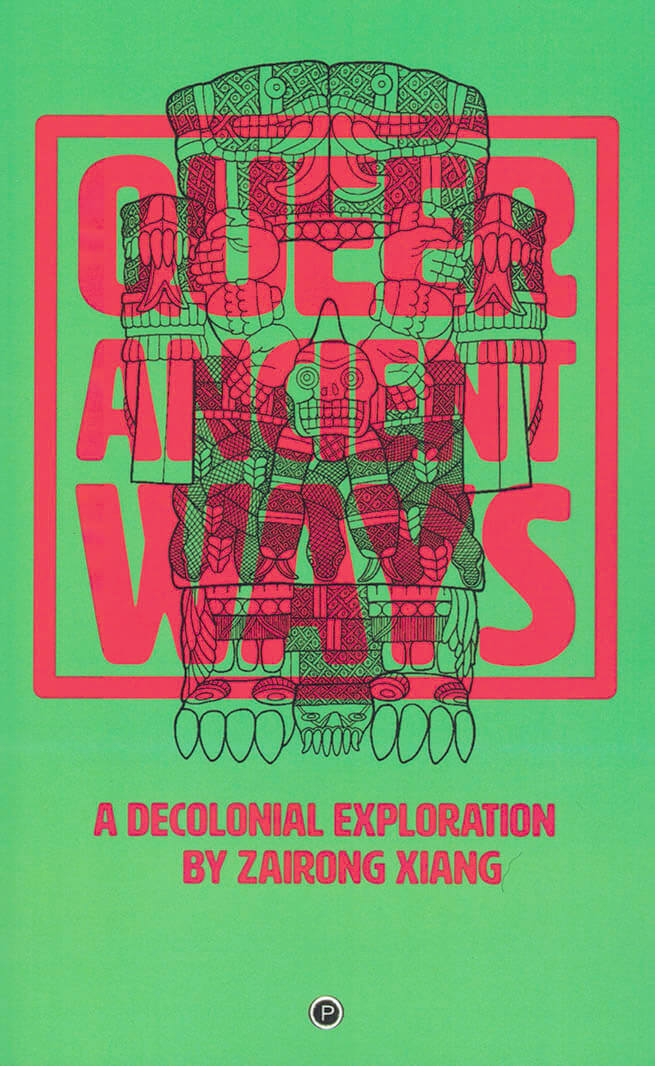
Queer Ancient Ways: A Decolonial Exploration
Queer Ancient Ways advocates a profound unlearning of colonial/modern categories as a pathway to the discovery of new forms and theories of queerness in the most ancient of sources. In this radically unconventional work, Zairong Xiang investigates scholarly receptions of mythological figures in Babylonian and Nahua creation myths, exposing the ways they have consistently been gendered as feminine in a manner that is not supported, and in some cases actively discouraged, by the texts themselves.
An exercise in decolonial learning-to-learn from non-Western and non-modern cosmologies, Xiang's work uncovers a rich queer imaginary that had been all-but-lost to modern thought, in the process critically revealing the operations of modern/colonial systems of gender/sexuality and knowledge-formation that have functioned, from the Conquista de America in the sixteenth century to the present, to keep these systems in obscurity.
At the heart of Xiang's argument is an account of the way the unfounded feminization of figures such as the Babylonian (co)creatrix Tiamat, and the Nahua creator-figures Tlaltecuhtli and Coatlicue, is complicit with their monstrification. This complicity tells us less about the mythologies themselves than about the dualistic system of gender and sexuality within which they have been studied, underpinned by a consistent tendency in modern/colonial thought to insist on unbridgeable categorical differences.
By contextualizing these deities in their respective mythological, linguistic, and cultural environments, through a unique combination of methodologies and critical traditions in English, Spanish, French, Chinese, and Nahuatl, Xiang departs from the over-reliance of much contemporary queer theory on European (post)modern thought. Much more than a queering of the non-Western and non-modern, Queer Ancient Ways thus constitutes a decolonial and transdisciplinary engagement with ancient cosmologies and ways of thought which are in the process themselves revealed as theoretical sources of and for the queer imagination.

Secret Poetics
Hélio Oiticica (1937-80) is widely considered one of Brazil's most significant artists, and his influence is felt across a range of disciplines including painting, film, installation and participatory art. He is well known as a key founder of the interdisciplinary movement known as Neoconcretismo, launched in Rio de Janeiro in 1959 with the collaboration of artists and writers including Lygia Clark, Lygia Pape and Ferreira Gullar.
Between 1964 and 1966, moving out of his Neoconcretist period, Oiticica wrote a series of lyrical poems entitled Poâetica Secreta (Secret Poetics), and he reflected in a private notebook on their significance for his wider practice as an artist. Despite Oiticica's global fame, his "secret" poems are almost unknown and have never been published as a collection.
This bilingual edition, with accompanying essays by translator Rebecca Kosick and critic Pedro Erber, uncovers the significance of poetry for Oititica's art and shows its importance to his thinking on participation, sensation and memory

Girls Like Us #6 - Secrets
Jessica Geysel, Sara Kaaman and 2 more
A secret can be a private space for self-creation – or a shared site of pleasure.
We explore secrets in a plethora of forms and contexts. From layered accounts of mediaeval ecstasy to the unexplored sensory experience of smell. From camouflaged play to queer readings of astrological charts and the hidden history of house music. From a very analog point of view to the outskirts of the internet.
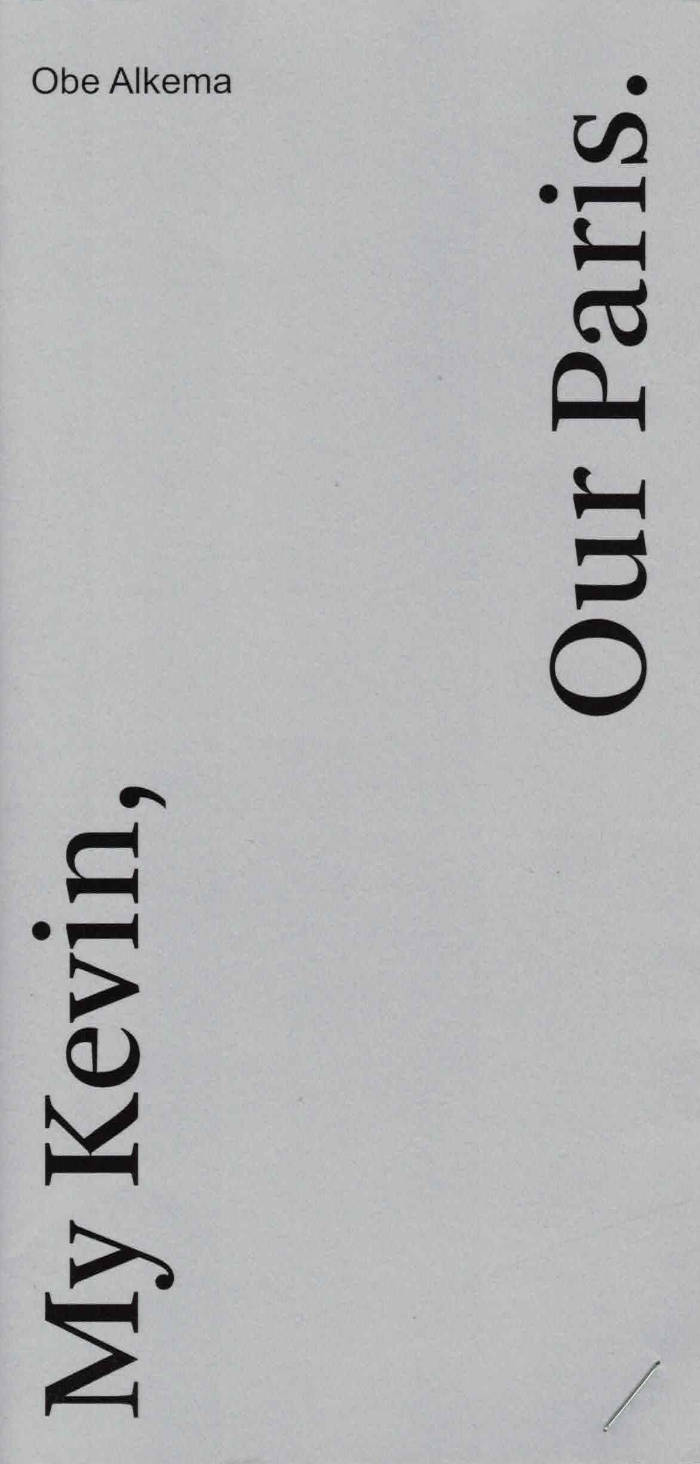
My Kevin, My Paris
In the fall of 2017, Obe Alkema got acquainted with the American poet Kevin Killian, first at the New Narrative conference at UC Berkeley, then at the Poets & Critics Symposium in Paris that was all about his poetry. A year and a half later, Alkema traveled back to Paris, this time as a participant of a writing residency. He was there to research the landscape of memory, but more than he expected and initially realized, Kevin’s death the previous month (June 2019) affected his return. Besides inevitable, mourning and remembering became obsessions for Alkema, as he shows in ‘My Kevin, Our Paris’, a memoir about Kevin Killian (1952–2019), but especially about his Kevin and their Paris.